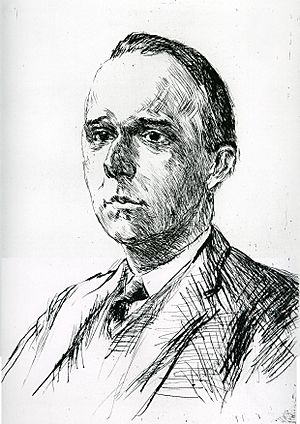Werner Jaeger facts for kids
Werner Wilhelm Jaeger (born July 30, 1888, died October 19, 1961) was an important German-American scholar. He studied and taught about ancient Greece and Rome. People who study these ancient cultures are called classicists.
Contents
Early Life and Education
Werner Wilhelm Jaeger was born in Lobberich, which was part of Germany at the time. He went to school in Lobberich and then in Kempen.
He later studied at two famous universities: the University of Marburg and the University of Berlin. In 1911, he earned his Ph.D. (a high-level university degree) from the University of Berlin. His main project was about a famous book by Aristotle called Metaphysics.
In 1914, he completed another important academic step called a "habilitation." This allowed him to become a university professor.
Becoming a Professor
When he was only 26 years old, Jaeger became a professor of Greek language and culture. He taught at the University of Basel in Switzerland. This was a special position because the famous philosopher Friedrich Nietzsche had once held it.
Just one year later, he moved to a similar teaching job at the University of Kiel in Germany. In 1921, he returned to Berlin. There, he took over from another very famous scholar, Ulrich von Wilamowitz-Moellendorff. Jaeger stayed in Berlin until 1936.
Moving to the United States
In 1936, Werner Jaeger decided to move to the United States. He was not happy with the rise of Nazism in Germany. He quietly showed his disapproval in his writings. For example, his book Humanist Speeches and Lectures (published in 1937) and his book Demosthenes (published in 1938) contained messages against the Nazi ideas.
Scholars in Germany understood his messages. Because of this, Nazi academics strongly criticized him.
In the United States, Jaeger became a full professor at the University of Chicago. He taught there from 1936 to 1939. After that, he moved to Harvard University. At Harvard, he continued working on a major project. This project was about the writings of an early Christian leader named Gregory of Nyssa. He had started this work before World War I.
Werner Jaeger stayed in Cambridge, Massachusetts, where Harvard is located, until he passed away. In 1944, he was chosen to be a member of the American Philosophical Society. This is a group that honors important thinkers.
Some of his students at Harvard later became well-known scholars themselves. These included Robert Renehan, James Doull, and Robert Crouse.
Main Works
Werner Jaeger wrote many important books and articles. Here are some of his most famous ones:
- Aristotle: Fundamentals of the History of His Development (1923, translated into English in 1934). This book explored how Aristotle's ideas changed over time.
- Paideia: The Ideals of Greek Culture (published in German from 1933–1947, translated into English from 1939–1944). This three-volume work is considered his most important. It explored the idea of "paideia," which means the education and culture that shaped the ancient Greek people.
- Humanist Speeches and Lectures (1937).
- Demosthenes (1938). This book was based on lectures he gave.
- The Theology of the Early Greek Philosophers (1947). This book looked at religious ideas in ancient Greek philosophy.
- He also worked on a large collection of the writings of Gregory of Nyssa, called Gregorii Nysseni Opera. This project started in 1921 and continued for many years.
See also
 In Spanish: Werner Wilhelm Jaeger para niños
In Spanish: Werner Wilhelm Jaeger para niños


